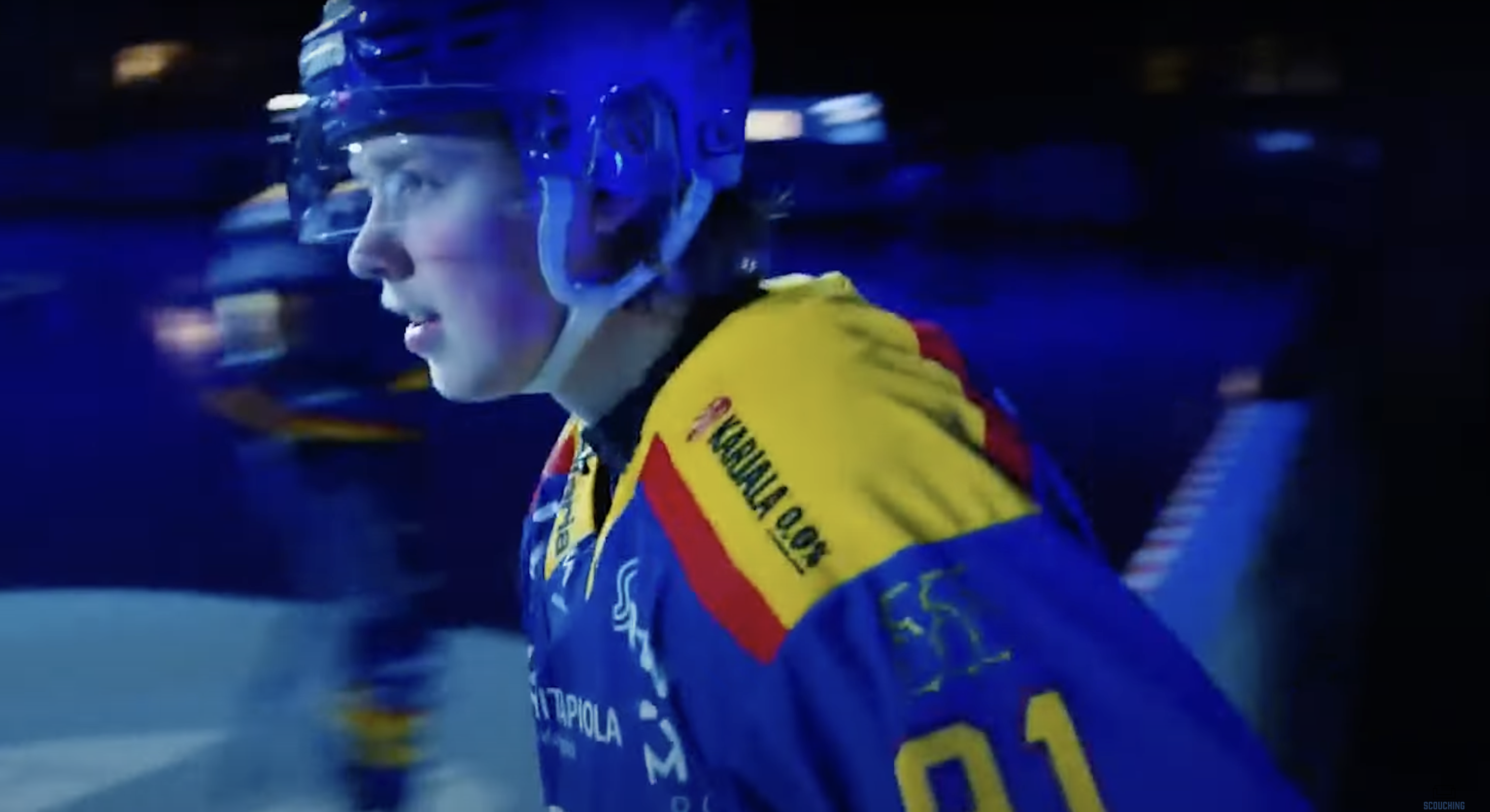
After last season, there was no doubt: Joel Eriksson Ek was a No. 1 Center. Scoring 30 goals alongside Kirill Kaprizov while forming a terrific, dominant line at 5-on-5 settled the matter. It's resolved. The only issue with him being a No. 1 Center is that the price for making him one was the Minnesota Wild losing the best third-line center in the league... Joel Eriksson Ek.
The Wild had a strong 1-2 punch down the middle with Eriksson Ek and Marco Rossi. It wasn't enough last year because the rest of their center depth included Ryan Hartman, Freddy Gaudreau, and Marat Khusnutdinov later in the season. It's hard to make the playoffs that way, let alone make a deep run.
Just look at the final four teams in the Stanley Cup Playoffs. The Edmonton Oilers have Connor McDavid, Leon Draisaitl, Ryan Nugent-Hopkins, and Adam Henrique down the middle. The Florida Panthers have Sasha Barkov, Anton Lundell, Sam Reinhart, and Sam Bennett to play the pivot. The Dallas Stars have more top-six centers than top-six forward spots. Even the New York Rangers, perhaps with the least impressive collection of centers left, has Mika Zibanejad, Vincent Trocheck, Filip Chytil, and Jack Roslovic.
Minnesota hopes to turn its draft capital into center depth soon. Riley Heidt might be in the NHL as soon as next year, and Danila Yurov is expected to join the Wild in 2025-26. They have other center projects in Michigan State's Charlie Stramel and the Ontario Hockey League's Rasmus Kumpulainen.
However, they don't have their version of Florida's Lundell: A two-way center that brings that high-end third-line center game like Eriksson Ek did in the past. That's where Konsta Helenius can come in, provided he falls to the Wild at the 13th overall pick.
I'm not comparing Lundell and Helenius solely because they are Finnish centers. Like Helenius, Lundell was a two-way forward with a track record of scoring in Liiga (Finland's top league) and the potential for offensive growth as a prospect. Better yet, Helenius has the edge on Lundell in scoring this season. His 0.71 points per game (14 goals and 36 points in 51 games for Jukurit) outpace Lundell's draft-year production of 0.64 points per game, compiled at HIFK.
In some ways, it's difficult to look at a 5-foot-11 Finnish center with more assists than goals and not clock him as a Mikael Granlund type. Helenius has that playmaking element to his game. "He is an excellent playmaker who can make a lot of difficult passes consistently," writes Corey Pronman at The Athletic. "He skates well and creates a lot of offense with pace for himself and others."
Pegging Helenius as a Granlund-type is kind of a loaded comparison in Minnesota. There's nothing wrong with Granlund's career: 544 points in 819 games is an accomplishment, as are four 60-point seasons. He's had a great career as a top-six forward. But the Wild pushed Granlund as a franchise savior, especially before signing Zach Parise and Ryan Suter. Not living up to those expectations made many fans focus on what he wasn't. He wasn't a center, gamebreaker, or particularly physical, etc.
Helenius is smart and a great passer, but he also brings some of those elements Granlund lacked. For one, Helenius creates his own shot in a way most Liiga prospects over the last decade haven't been able to do as 17-year-olds.
Let's look at the top-scoring draft-eligible Finnish forwards over the last decade and see where Helenius falls among them:
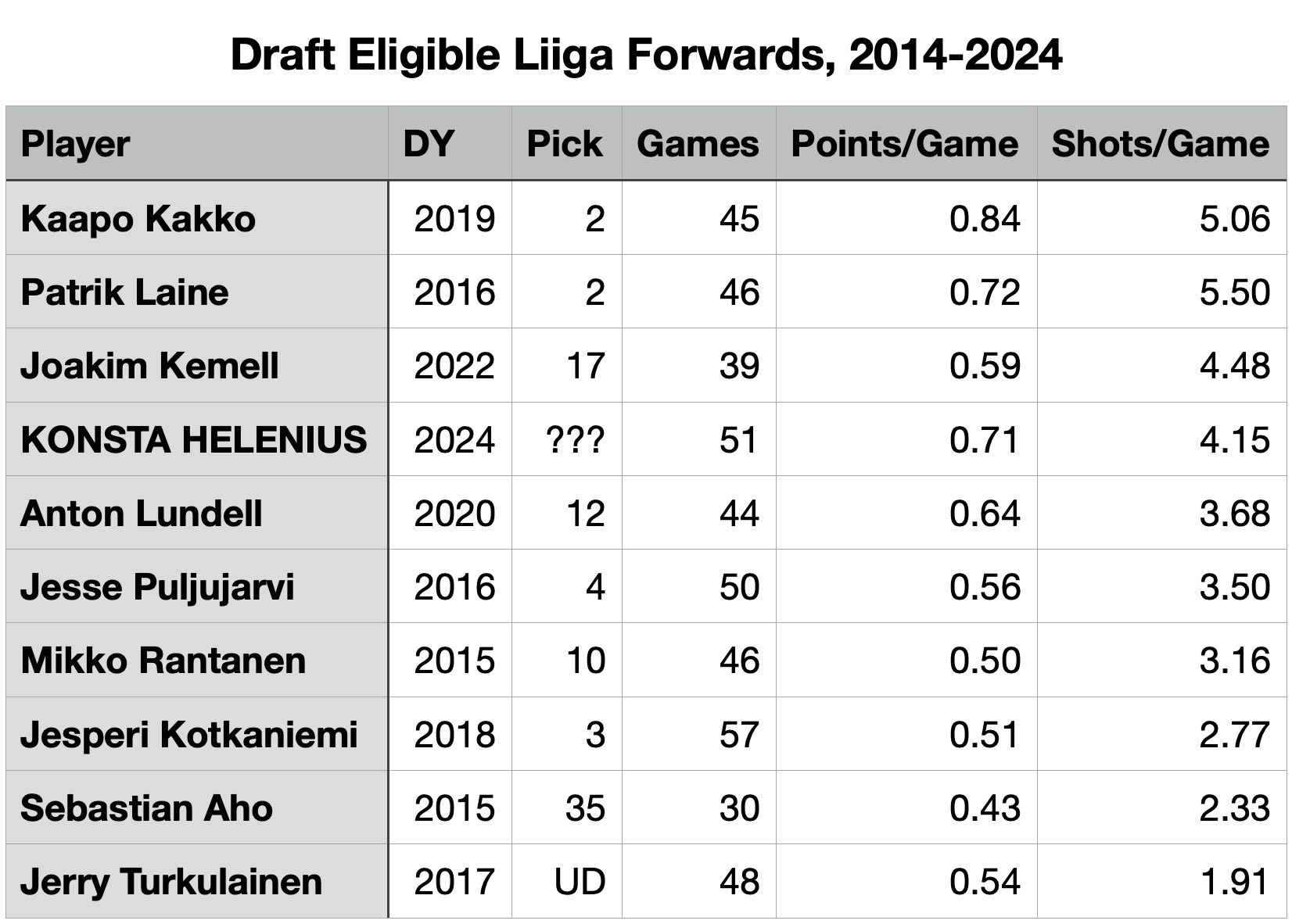
Helenius notably has an edge over Lundell, Mikko Rantanen, and Sebastian Aho. That shooting rate in a men's league is impressive, and not just for his age. Helenius finished 11th in the league with 212 shots on goal in addition to his excellent distribution. There's room to grow in terms of finishing skills; he only shot 6.6% for the season. Still, that's something we've seen players like Granlund, Eriksson Ek, and Rossi improve with time.
Besides, if that shooting percentage causes Helenius to slip down the board to 13 overall, that's the Wild's gain. A 20-goal season from Helenius would have made him a sure-fire top-10 pick and probably a top-five.
Helenius also brings that third-line mentality to his game, which would make him ideal to follow in Eriksson Ek's footsteps. As a 17-year-old, he was already one of the stronger play-drivers in Liiga. His 54.7% Corsi For at 5-on-5 ranks 42nd among forwards with 20-plus games. Helenius took another step in the playoffs, controlling 60.4% of the shot attempts, which was top-10 in the league.
Helenius also plays the game with far more snarl than you might expect from a 5-foot-11 winger. Olli Jokinen -- the former four-time 30-goal scorer who played 1231 career NHL games -- coached Helenius at Jukurit last season. "There's not a ton of hits over here in the Finnish league but I would say that he'll have 4-6 hits [per] game," Jokinen told The Athletic's Scott Wheeler. "So he plays the game the right way, a really hard way, almost more North American than the North American players in [Liiga]."
Add all of that up, and you have a player who is a near-lock to play in the NHL. Hockey Prospecting's Byron Bader's model agrees with that assessment, giving him a 99% chance of becoming an NHLer. Only Macklin Celebrini and Ivan Demidov join Helenius in that 99% Club. As for upside, Bader's model projects Helenius' odds of becoming a star player (0.7-plus points per game for his NHL career) at 67%. That ranks eighth in this draft class.
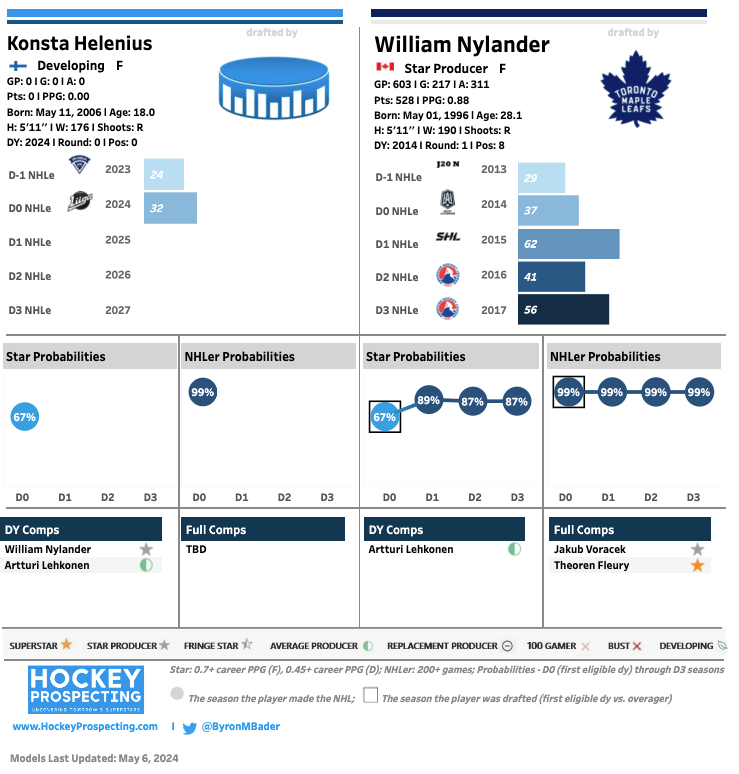
The question becomes whether Minnesota can take a shot at Helenius. Right now, it's anyone's guess. Scouts have little consensus about how the draft board will play out past the first few picks. According to Bob McKenzie's draft rankings, Helenius is the ninth-best player according to his contacts in the scouting world. Elite Prospects' consolidated rankings have Helenius at 11th.
The margin for error is such that Helenius can slip to the Wild -- or perhaps even further. Pronman and Wheeler conducted a joint mock draft on Wednesday, where Wheeler (picking for Minnesota) passed on Helenius for the sniper Cole Eiserman. So, who knows?
But if Helenius falls to No. 13, Minnesota will have to think long and hard about adding another center to their stable. Front offices are obsessed with tracking the postseason for trends on where the league is going and how to make "playoff-style" hockey teams.
Look at the teams on top. The lesson of the 2024 playoffs isn't an ode to hockey, and it's undoubtedly not revolving around getting hulking defensemen. Instead, it's simple: When you think you have enough centers, get more. The Wild don't have enough now, but getting Helenius into the pipeline might tie their organizational depth together.
Think you could write a story like this? Hockey Wilderness wants you to develop your voice, find an audience, and we'll pay you to do it. Just fill out this form.
-
 4
4




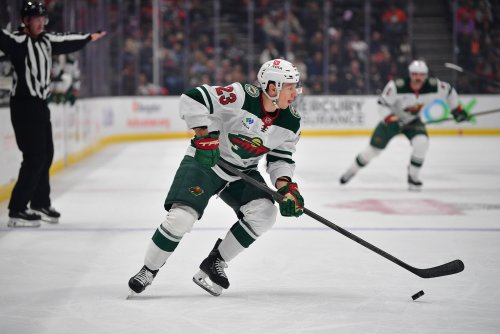
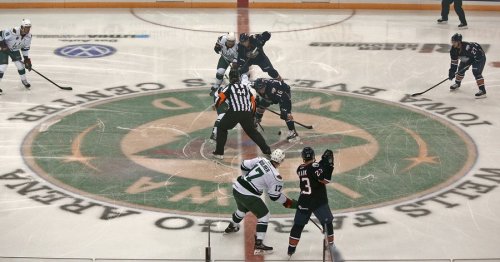


Recommended Comments
Join the conversation
You can post now and register later. If you have an account, sign in now to post with your account.
Note: Your post will require moderator approval before it will be visible.